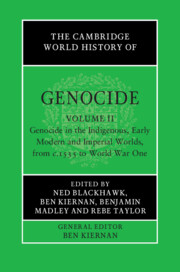Book contents
- The Cambridge World History of Genocide
- The Cambridge World History of Genocide
- The Cambridge World History of Genocide
- Copyright page
- Contents
- Figures
- Maps
- Tables
- Contributors to Volume ii
- Introduction to Volume ii
- Part I Settler Colonialism
- Part II Empire-Building and State Domination
- Part III Nineteenth-Century Frontier Genocides
- 15 The Genocidal French Conquest of Algeria, 1830–1847
- 16 ‘The Bloody Ground’
- 17 ‘A War of Extermination’
- 18 Lessons from Canada
- 19 Frontier Massacres in Australia, 1788–1928
- 20 Genocide in Van Diemen’s Land (Tasmania), 1803–1871
- 21 Genocide in Northern Australia, 1824–1928
- Part IV Premonitions
- Index
15 - The Genocidal French Conquest of Algeria, 1830–1847
from Part III - Nineteenth-Century Frontier Genocides
Published online by Cambridge University Press: 23 June 2023
- The Cambridge World History of Genocide
- The Cambridge World History of Genocide
- The Cambridge World History of Genocide
- Copyright page
- Contents
- Figures
- Maps
- Tables
- Contributors to Volume ii
- Introduction to Volume ii
- Part I Settler Colonialism
- Part II Empire-Building and State Domination
- Part III Nineteenth-Century Frontier Genocides
- 15 The Genocidal French Conquest of Algeria, 1830–1847
- 16 ‘The Bloody Ground’
- 17 ‘A War of Extermination’
- 18 Lessons from Canada
- 19 Frontier Massacres in Australia, 1788–1928
- 20 Genocide in Van Diemen’s Land (Tasmania), 1803–1871
- 21 Genocide in Northern Australia, 1824–1928
- Part IV Premonitions
- Index
Summary
The question as to whether a genocide took place in nineteenth-century Algeria has always been deeply contentious in western academic scholarship. By contrast, it has tended to be accepted as a given in many Algerian accounts of the past, both as expressed in conversation and in published works. This divergence has arguably been grounded in the manner in which the prevailing means of framing and defining genocide varied wildly between these two literatures. Curiously, Algerian texts, even when they are 'popular' rather than 'academic' accounts lie closer to the spirit and terms of reference of the scholarly field of Genocide Studies. Looked at comparatively, the violence of imperial Algeria shares remarkable affinities with both the exterminatory impulses and outcomes of other settler colonies, as well as other instances of European incursions into the Arabo-Islamic world, especially in Algeria's north African neighbours Morocco and Tunisia, Mauritania and Libya. Lemkin's diagnostics of genocide certainly seem to map onto the organised system of massacres perpetrated in Algeria, the general desire to cause harm to 'recalcitrant' groups en masse, the belief in the merits of a Maghrebi tabula rasa, and the 'slow violence' of the destruction of groups, communities and identities.
- Type
- Chapter
- Information
- The Cambridge World History of Genocide , pp. 361 - 382Publisher: Cambridge University PressPrint publication year: 2023



